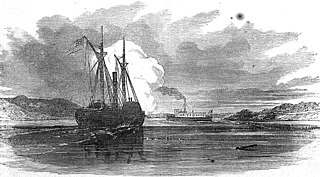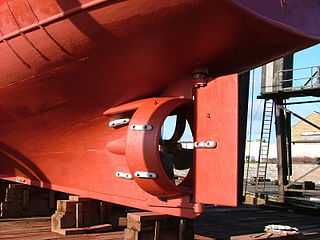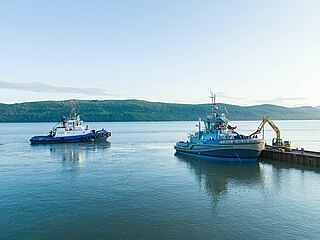
A tugboat or tug is a marine vessel that manoeuvres other vessels by pushing or pulling them, with direct contact or a tow line. These boats typically tug ships in circumstances where they cannot or should not move under their own power, such as in crowded harbors or narrow canals, or cannot move at all, such as barges, disabled ships, log rafts, or oil platforms. Some are ocean-going, and some are icebreakers or salvage tugs. Early models were powered by steam engines, which were later superseded by diesel engines. Many have deluge gun water jets, which help in firefighting, especially in harbours.

The Voith Schneider Propeller (VSP) is a specialized marine propulsion system (MPS) manufactured by the Voith Group based on a cyclorotor design. It is highly maneuverable, being able to change the direction of its thrust almost instantaneously. It is widely used on tugs and ferries.

Canadian Forces Base Esquimalt is Canada's Pacific Coast naval base and home port to Maritime Forces Pacific and Joint Task Force Pacific Headquarters. As of 2018, 4,411 military personnel and 2,762 civilians work at CFB Esquimalt.
The Royal Canadian Navy uses hull classification symbols to identify the types of its ships, which are similar to the United States Navy's hull classification symbol system. The Royal Navy and some European and Commonwealth navies use a somewhat analogous system of pennant numbers.

The Ville-class tug are a class of harbour tugboats employed by the Royal Canadian Navy.

The Glen-class tug is a class of naval tugboat operated by the Royal Canadian Navy. Constructed in Canada, the class entered service between 1975 and 1977. The five vessels that comprise the class are split between the two major naval bases of the Royal Canadian Navy. The Royal Canadian Navy operated a fleet of tugboats during the Second World War which were also named the Glen class. The vessels of the current Glen class are each named after one of the vessels of the earlier class.

CFAV Firebrand is a Fire-class fireboat in the Royal Canadian Navy designed by Robert Allan Ltd. Firebrand is based in CFB Esquimalt, on Vancouver Island. Her sister ship CFAV Firebird was based in CFB Halifax and decommissioned in 2014.

CFAV Firebird was a Fire-class fireboat in the Royal Canadian Navy designed by Robert Allan Ltd. Firebird was based in CFB Halifax, in Halifax, Nova Scotia. Her sister ship CFAV Firebrand is based in CFB Esquimalt.
Kitano was a Japanese container ship. She was delivered in Japan in 1990 to Japanese container line NYK and scrapped in China in November 2011.

CFAV Glendyne is a Glen-class naval tugboat operated by the Royal Canadian Navy. It was built at Yarrow Shipyard in Esquimalt, British Columbia. The ship was launched in 1975 and delivered on 8 August 1975. Attached to Maritime Forces Pacific, the ship is based at CFB Esquimalt.

CFAV Glendale is a Glen-class naval tugboat operated by the Royal Canadian Navy. Built at Yarrow Shipyard, Esquimalt, British Columbia and launched in 1975, the ship was delivered on 16 September 1975. Attached to Maritime Forces Pacific, the ship is based at CFB Esquimalt.
Tillicum or Tilikum is a word in Chinook Jargon that means people, family, tribe, and relatives, and may refer to:
CNAV Endeavour was an Endeavour-class research ship. The vessel served the Royal Canadian Navy and later the Canadian Forces from 1965 to 1999. Endeavour performed research in oceanography and anti-submarine warfare, primarily on the West Coast of Canada.

The Fire-class fireboats/yard tractor tugs were two fireboats operated by the Royal Canadian Navy. The two vessels are CFAV Firebrand and CFAV Firebird.

A ducted propeller, also known as a Kort nozzle, is a marine propeller fitted with a non-rotating nozzle. It is used to improve the efficiency of the propeller and is especially used on heavily loaded propellers or propellers with limited diameter. It was developed first by Luigi Stipa (1931) and later by Ludwig Kort (1934). The Kort nozzle is a shrouded propeller assembly for marine propulsion. The cross-section of the shroud has the form of a foil, and the shroud can offer hydrodynamic advantages over bare propellers, under certain conditions.

Henry Christoffersen is a shallow draft pusher tug built to operate on Canada's Mackenzie River. She was launched in 1973, and was the name ship of her class. She was designed by the Robert Allan Ltd. ship architects. She was built in Esquimalt, BC at a shipyard known as Burrard Yarrows.

Although it is a busy port, there is sparse record of fireboats in Halifax, Nova Scotia.

The Naval Large Tugboat is a class of naval tugboat operated by the Royal Canadian Navy. Four Naval Large Tugboats (NLT) are being built by Ocean Industries Inc. of L'Isle-aux-Coudres under the National Shipbuilding Strategy. The first two tugboats will be based at CFB Esquimalt, and last two will be based at CFB Halifax. The steel cutting for the first NLT commenced in September 2020 and the lead ship, CFAV Haro, was launched on 15 July 2022.









